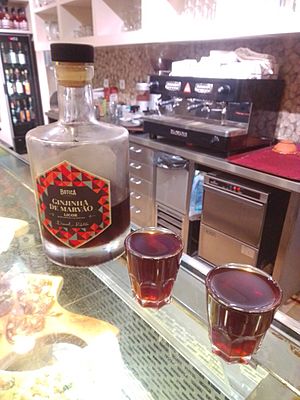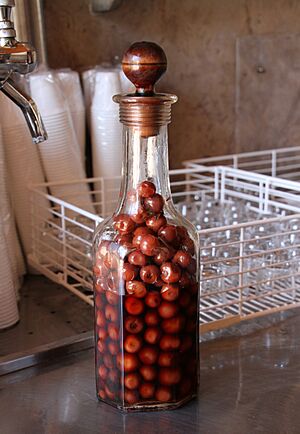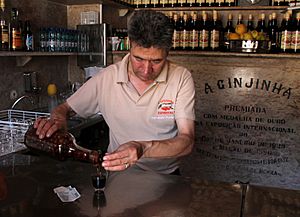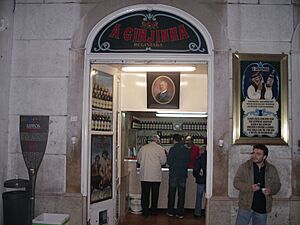Ginjinha facts for kids
Ginjinha (say "gin-ZHEEN-yah"), often called Ginja, is a popular sweet drink from Portugal. It's a type of liqueur made from a special kind of cherry called the ginja berry, which is a sour cherry.
To make Ginjinha, these cherries are soaked in alcohol, usually a strong spirit called aguardente. Sugar is added, and sometimes spices like cloves or cinnamon sticks give it extra flavor. Ginjinha is usually served in a small shot glass, often with one of the cherries at the bottom. It's a favorite drink in many parts of Portugal, especially in cities like Lisbon and towns like Óbidos.
Contents
The Story of Ginjinha
The first place in Lisbon to sell Ginjinha was a shop near Praça de São Domingos. The idea for this drink came from a friar named Francisco Espinheira. He was from the Church of Santo António. He experimented by soaking ginja cherries in aguardente, then adding sugar, water, and cinnamon.
His new drink was an instant hit! Ginjinha quickly became a very popular drink in Lisbon. Even today, the business that started it all is still run by the same family, now in its fifth generation.
Each year, about 150,000 liters of Ginjinha are made. Most of it, about 90%, is enjoyed right there in Portugal. Only a small amount, around 10%, is sent to other countries, mainly the United States. While you can find this traditional liqueur all over Portugal, it's especially famous in the Lisbon area. In the town of Óbidos, Ginjinha is often served in a small cup made of chocolate, which you can eat after drinking the liqueur!
Famous Ginjinha Shops in Lisbon
Lisbon has several historic shops that specialize in Ginjinha. These places have been serving the drink for many years:
- Ginjinha Espinheira: This shop has been open since 1840.
- Ginjinha Sem Rival: This one started in 1890.
- Ginjinha Rubi: It opened its doors in 1931.
- Ginginha do Carmo: A newer shop, open since 2011.
Ginja from Óbidos and Alcobaça
The sour cherries used to make Ginja in the towns of Alcobaça and Óbidos are very special. In 2013, people applied for a special status for these cherries. This status, called a PGI (Protected Geographical Indication), helps protect the quality and origin of local products. It means that only Ginja made with cherries from these specific areas can use this special name.
Images for kids
See also
 In Spanish: Ginjinha para niños
In Spanish: Ginjinha para niños
 | Audre Lorde |
 | John Berry Meachum |
 | Ferdinand Lee Barnett |








